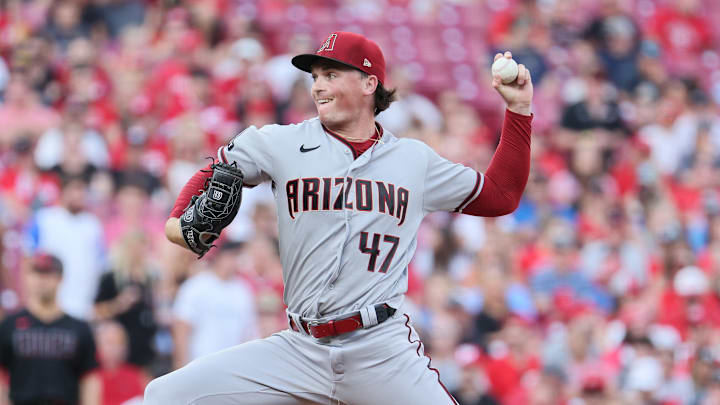The Arizona Diamondbacks have an outstanding 1-4 at the top of their starting rotation. Zac Gallen, Merrill Kelly, Eduardo Rodriguez, and Brandon Pfaadt head the rotation. But the fifth spot is a little more up in the air. Currently, there isn’t a definite number five starter for the Snakes. But there are a handful of players you could see as the team’s number five starter. A good Spring Training could change the tide of things, but as we approach the pre-season, here is who could secure the number five rotation spot for the Diamondbacks right now.
Tommy Henry
Tommy Henry might have the inside track for the 5th rotation spot. The left-hander didn’t do badly in his 2023 rookie campaign, and had he continued to pitch like that over a larger sample size, the role may have been his until he proved otherwise. But he was limited to just 89 innings last year, which leaves the opportunity for someone else to swoop in and overtake Henry.
Henry had a 4.15 ERA, 4.88 FIP, and 1.36 WHIP. He had a poor 16.8% K rate along with a below-average 9.2% walk rate. His HR/9, however, was slightly better than the league average, sitting at 1.21. Henry also had some solid batted ball numbers. He was in the 73rd percentile of exit velocity (87.9 MPH), 89th percentile of hard-hit rate (32.4%), as well as the 54th percentile of barrel rate (7.6%).
Although Henry had a solid ERA and was good at limiting hard contact, there are some underlying factors that are worrying. He had a 5.29 SIERA, 5.40 xFIP, and a a 130 DRA- (95 ERA-). Sure, while Henry would be filling the role of a 5th starter, and you’re not going to expect your 5th starter to be an ace, you’d probably want something a little better than an ERA above 5.00.
As of right now, I’d say that Henry is one of the more likely candidates to secure the 5th starter job. Given that he didn’t do poorly last season, he will give him a leg up on the rest of the competition. However, I definitely would not say he’s set in stone as the 5th starter. At the very most, it’s his position to lose.
